Five Men’s NCAA Records That Will Be Broken This Year
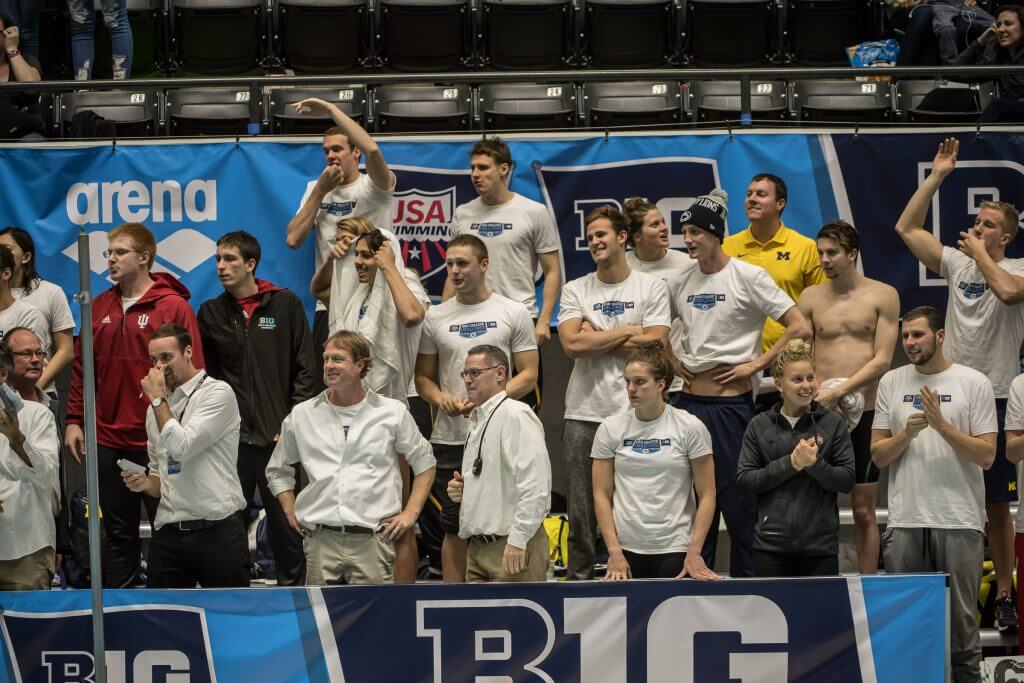
By Benny Liang, Swimming World College Intern.
The 2017 Division I NCAA Championships are coming up faster than you know it. In less than two months, the fastest swimmers on the western hemisphere will converge on the IUPUI Natatorium to showcase the fruit of their labors over the past six months.
This year’s championships will be unique. Out of the 13 individual events, only two will lack a defending champion as Josh Prenot (400 IM) and Chris Swanson (1650 free) both graduated last spring. This means that while there are more events with a heavy favorite to take the title, the odds of seeing a stunning upset is also increased.
In a high pressure meet like this, it can be said that nothing is predictable. Who knew that Townley Haas would win the 200 free by over a second at last year’s Championships? How many people thought that Alabama would take the 200 medley relay over Texas and California? With that being said, here are five NCAA records that I believe will be broken this year.
No. 1 – 800 Free Relay (6:08.03)
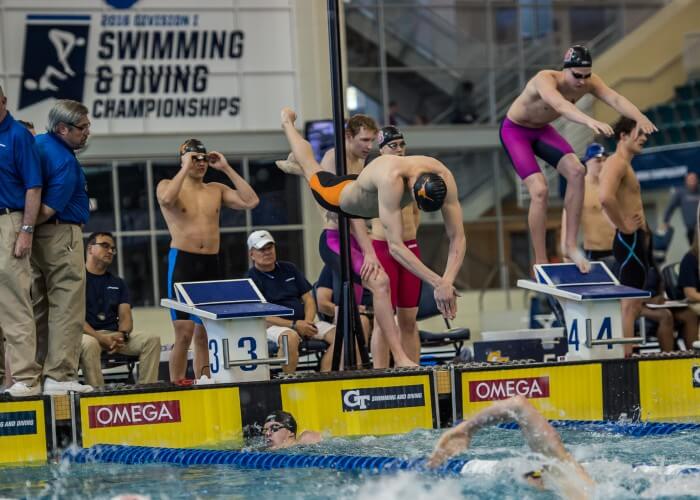
Photo Courtesy: Peter H. Bick
Last year, for the first time in NCAA history, the 800 free relay was moved from Friday to Wednesday. In previous years, the 200 freestyle was scheduled on the same day as the 800 free relay. This meant that some 200 freestylers had to swim the same race three times in one day. By moving the relay to the very beginning of the meet, teams could put up four completely fresh swimmers. Predictably, this led to some very fast swimming. Not one but three teams went under the old NCAA record set in 2014 by Michigan. The champions, Texas, lopped nearly two seconds off the record, winning in 6:08.03.
As impressive as that is, I think that Texas has more to offer. First off their entire relay returns, so there’s no question of “Will they be able to replace so-and-so?” Second, Joseph Schooling and Townley Haas had phenomenal performances at the Rio Olympics; Schooling won the 100 meter fly in Olympic record-time and Haas swam the fastest split of the Games in the 800 free relay. It makes sense that the confidence gained will carry into this season. Third, Jack Conger and Clark Smith are both in their final year at Texas. The motivation to leave their mark on the record books will give them the edge they need to break this record.
No. 2 – 400 IM (3:34.50)
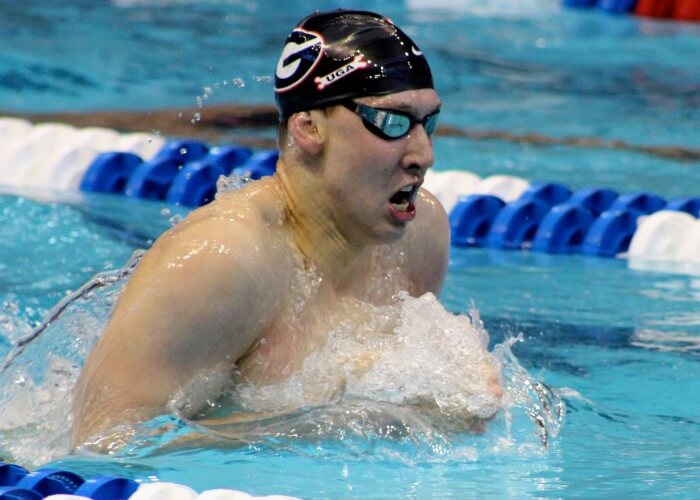
Photo Courtesy: Taylor Brien
You might look at the results of last year’s meet and say “But wait, Josh Prenot graduated and the returning runner-up, Will Licon, is still two seconds off the record!” That is true, but the X-Factor is Chase Kalisz. Kalisz won the 400 IM in 2014, setting the NCAA record in the process. His time of 3:34.50 stands as the fastest in history by over a second. His absence in 2016 was due to his decision to redshirt the season in preparation for the Olympic Trials. He qualified for the Games, and won silver in the 400 IM. His best time before Rio was set the summer of 2013, before he swam his NCAA record time in the 400 IM. I believe that this sets him up perfectly to not only reclaim his title, but also smash his record.
No. 3 – 200 Medley Relay (1:22.27)
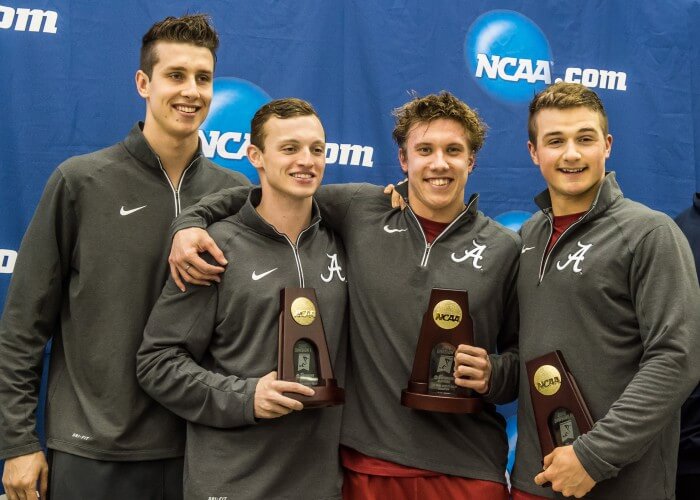
Photo Courtesy: Reagan Lunn/Georgia Tech Athletics
One one-hundredth was the difference between Alabama and an NCAA record. Half a second was the margin between third place Texas and Alabama. With three teams so close to the record, it would be hard to believe the record won’t be broken soon. However, there is a catch. Unlike in the 800 free relay, the top teams in the shorter medley relay do not retain all members of their relay. Greek superstar Kristian Gkolomeev left the Crimson Tide, the Golden Bears graduated Tyler Messersschmidt, and the Longhorns lost John Murray. Luckily for top tier DI teams, good sprinters are a dime-a-dozen and in many cases, it’s not hard to find someone who can put together a 50 free. While finding someone to anchor their sprint relays will be a hurdle, it’s not one that is impossible to surpass.
No. 4/5 – 100 & 200 Fly
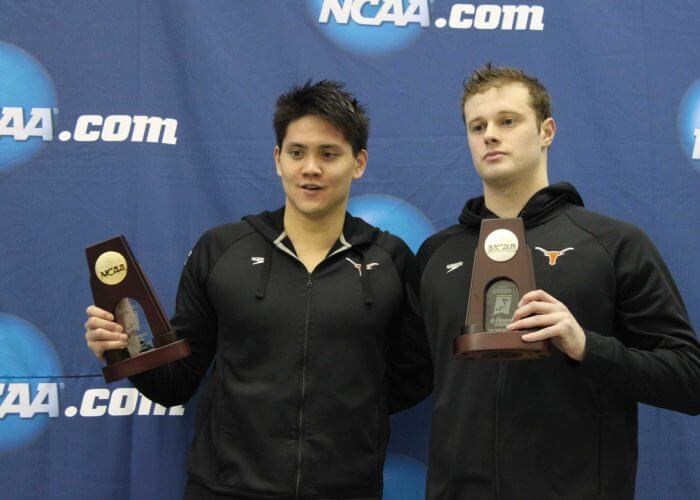
Photo Courtesy: Andy Ringgold / Aringo Photos
Joseph Schooling has been the face of NCAA butterfly for the past two years. In 2015, he led a six man Longhorn charge in the 100 fly, earning Texas a whopping 91 points, and also won the 200 fly. In 2016, he dominated the field, setting NCAA records in both distances. Right behind Schooling is teammate Jack Conger, who has finished in a close second every race except the 100 fly in 2016, where Florida’s Caeleb Dressel took second.
In the 100 fly, Schooling returns to defend his title, and there is no reason he should fail; his performance at Rio supports that well enough. In the 200 fly, about a tenth of a second has separated Schooling and Conger each time they’ve clashed. Schooling got the upper hand by nine-hundredths over Conger last year, but I believe that Conger will edge out Schooling for the record his senior year.
All commentaries are the opinion of the author and do not necessarily reflect the views of Swimming World Magazine nor its staff.



